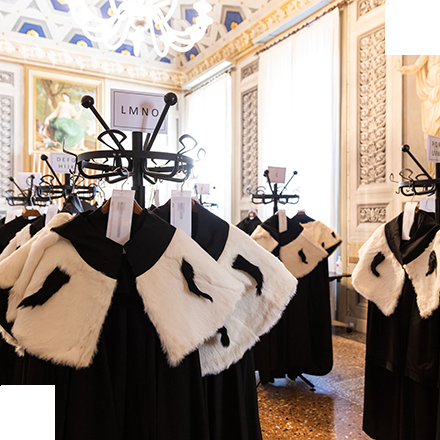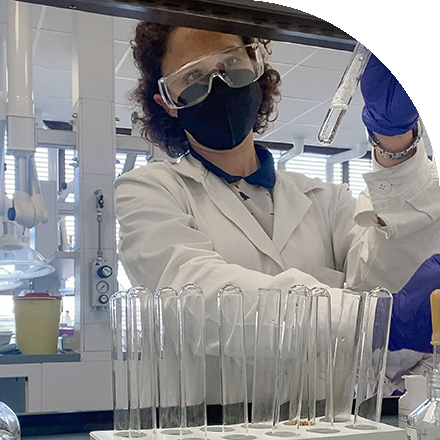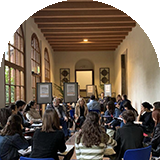Università Cattolica del Sacro Cuore Largo A. Gemelli, 1 - 20123 Milan
Sebastiano Lombardi
Director of Retequattro
Twenty years ago, Sebastiano Lombardi left the Catholic University of Milan with a degree in Modern Literature in his hand. Today he remembers those moments as a student from his office in Viale Europa, in Cologno Monzese: after a varied career in the television field – with experiences in Mediaset, Rai and then again in Mediaset, of which he was also Director of Marketing News – Lombardi became director of Retequattro in November 2014.
After graduating from high school, he enrolled in the Faculty of Economics at the University of Pavia. A month later, while he was bent over his Business Administration books, his sister asked him, "And what does this have to do with you?" Lombardi understood that he had to change his course of study and the next day he enrolled in Modern Literature: "I realized that I could not do anything else, thanks to the suggestions of the Lyceum." The study of languages such as Latin and Greek, according to Lombardi, brings an underlying curiosity for language, to which everything can ultimately be traced.
His university and professional career was thus increasingly centred on language and its forms, starting with Latin, to which he devoted himself with passion, especially the first two years: "I was absolutely amazing ," he laughs, "in translations: I remember reading the Annals of Tacitus without the need to translate them. I've never been so good at anything again." And Latin, what does it have to do with television and advertising to which it was then directed? Like any other language, it is a way of filtering the world and, like any other, it poses the challenge of understanding. «The passion for narrative forms, the attention to the smallest details of language leads you to understand what can move a television program in viewers. Just as a text moves something in you when you read it and allows you to translate it well, not only technically, but also emotionally."
The study on the Annals of Tacitus, as on other authors, was able to bring Lombardi closer and closer to the idea of what he wanted to do with his professional life. In fact, he chose to take a major in Communication, thanks also to Federico Di Chio – Deputy Director of Strategic Marketing of the Mediaset Group and professor of Communication and Entertainment Sciences – at the time assistant to Francesco Casetti, professor of Sociology of Communication. Accomplices Gianfranco Bettetini and Fausto Colombo, "who helped me understand what I really liked". It was for those courses that Lombardi understood that he wanted to work in the television field: the more he studied it, the more it revealed itself to him as the dimension capable of enhancing his greatest passions. "I wanted to apply the filter of language analysis to reality, and I saw more and more in television that world in which many different languages meet: first of all, a visual one, rich and complex, even if not as refined as the cinematographic one, and a verbal one." The form of television language, as demonstrated by the thesis with which Lombardi obtained his degree in Theories and Techniques of Social Communication, with Gianfranco Bettetini, derives in some way from the Homeric epic and from the linguistic casts coming from the setting that the oral story had structured over the millennia. "My thesis, which overlapped the ancient and the contemporary, gave me enormous satisfaction: it was a work of investigation and discovery, with which I understood some of the mechanisms of the machine where I work now."
The meeting with the professors of the Catholic University was therefore fundamental for Lombardi: with great affection he remembers Francesco Casetti; with gratitude, affection and sympathy Fausto Colombo, who followed him in his thesis work. "And I have a very respectful memory of Bettetini. He was the one who complicated everything: he applied to this world, which could be reduced to some fairly simple forms, the infinite complexity of semiotics." […]
Initially, for Sebastiano Lombardi, the University was a place of education, of which he lived above all the lessons. "I'll admit, I was a terrifying nerd: the first two years I took all the classes and then I spent the rest of the time at home studying." Then he realized that he could replace at least part of his obsession with study with greater participation in life, and the University thus also became a physical world, where he could enjoy the spaces, the noises, the silences, the spring sun that warmed the courtyard.
After completing his studies, Lombardi could not have imagined that he would work in marketing for Mediaset and Rai and that he would then become the director of a television network; No lightning bolt made him understand what he would do "when he grows up". "Di Chio called me, a few months after graduating, to do an internship in marketing at Mediaset. For a moment I had the illusion that I had arrived before I had even left." Then it was a complicated career, full of setbacks, setbacks, fears, disillusionments and tricks to make it to the end of the month. "I didn't have a permanent job until I was thirty, I was employed until I was thirty-three. The following year, I found myself a manager."
At the age of twenty, there is a risk of running into a great misunderstanding, the illusion that life is a TV series, that life is made up of linear paths and inspirations. "In The Interview on Identity, Baumann explains that what we read about linear in other people's paths is very far from reflecting the non-linearity of our life path."
Lombardi's path was tortuous and tense towards a result of which he was not exactly aware; Somewhat surprising, but never random. "Chance and luck don't exist. Those who know how to cultivate curiosity find within themselves a sort of "tension towards", which determines chance. If I got here, it's because I had it inside." […] "Leaps forward are made when you have the opportunity to do the things that are most natural to you and in which you can make a difference, compared to others, because you have your own way." And that way is developed in particular during the years of one's university education, refined and cultivated.
"To any young person who is entering the university world, I advise him to take advantage of every exam to read the texts ten times more than his capacity for endurance would lead him to think he can do. Never again will you have the depth, patience and obsessiveness in reading that you have when you study. At the same time, I would advise him to be confused, to try as much as possible to frequent non-trivial knowledge, not to be obsessed with what is ratified by official culture." And who is coming out of university? "Never forget to be curious and, if possible, don't try to be safe right away. Not to surrender to that terrible anxiety that takes hold the next day, when you go out with 110 laude and realize that you are not the king of the world as you thought." Once that shock has been overcome, curiosity and the desire to put oneself in crisis and to the test have been maintained, beyond the fact that the world takes care of itself, one can make oneself a richer person.
"I don't think I'm successful, I don't feel like I'm a person who has succeeded: I feel like I'm a person who does something that belongs to me and therefore happy. If more people could set this as a life goal – who, at least, have the immense privilege of being able to do so – and devote themselves to something that belongs deeply to them, I think there would be fewer career anxieties, less gratuitous pride and much more existential happiness.
Presenza, 2015 – Ne ha fatta di strada di Alessandra Lanza






